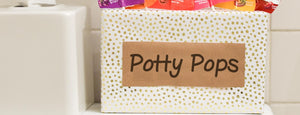
Potty Training Tips for Parents
My name is Jackie and I have the coolest toddler in the world; ok, maybe I’m a little biased, but he is pretty awesome. I, on the other hand, am a hot mess mom, especially when it comes to how to potty train a toddler. Having been a mother for an entire 21 months (it’s ok to still count months when he’s under two), I have become an expert in changing diapers. I was less of an expert in getting him potty trained, but I figured, hey it can’t be much harder than changing a diaper. Here are some of the lessons I learned.
- All the research and preparation cannot prepare you for the real thing
To start, I did what any level-headed mother would do – scoured social media for tips, had tons of potty related nightmares, and read Potty Time with Elmo more times than I’d care to recount. I bought a fancy potty that played fun music, some training undies, and of course lots of extra paper towels. I was probably as prepared as possible without having done this before, but let me tell you, Potty Time with Elmo is a little different than Potty Time with Calvin.
- Give into bribery - quick
As we embarked on this new journey, getting Calvin to sit on the potty was the first obstacle. If you don’t have a child – toddler’s hate sitting still, it might actually be against their toddler mantra. I immediately turned to bribes – YumEarth organic lollipops, new toys to play with, or even some organic fruit snacks – to get him to sit still. (Organic candy is clearly a big motivator in our home.)
- Use your toddler’s interests
One of the things I’ve learned after almost 2 years as a mom, my son loves dogs and trains. When we decided to potty train with underwear, we thought it would help get him excited about the process, we picked out some Paw Patrol and Thomas the Train undies. As a bonus “don’t pee pee on the puppy,” seemed to make complete sense to him – so that was reassuring (especially to our own dog).
- Accidents will happen, don’t panic
The next big challenge was getting the pee in the potty and not on the floor. More specifically, avoiding the need to clean the floor 15 times a day. One time, Calvin was wearing his “undies,” because after a while he started preferring them to diapers (no kidding), and sitting eating in his high chair. He made the universal symbol for having to go the bathroom by screaming “pee pee,” and pointing. I grabbed him, brought him to his potty, and started helping him pull down his pants – much to my surprise, several you know what’s fell out, then what seemed like a waterfall, followed by me slipping and falling right into the stinky mess – causing me to yell out in surprise and Calvin to burst into tears. This of course happened right after I had diligently cleaned the entire kitchen. The honest to goodness easy fix for this was starting to put him on the big toilet facing backwards – as a bonus he was even more motivated by the prospect of flushing.
- Practice makes perfect
This is directed at myself, not my son. Even with all the patience in the world, which I certainly don’t have, potty training is frustrating. Practicing being patient with your little one can make a world of difference. Instead of getting upset if Calvin had an accident, I showed him it was ok by remaining calm and even giving him paper towels to help me clean up. This has paid dividends both in helping him to stay calm and him learning a little more about cleaning (I will take all the help I can get). I also started to notice that once I was better at staying calm, he quickly picked up on it and took his time with telling me he had to use the bathroom, instead of upsetting himself and having an accident.
- You still might get judged
You’re a parent. If you’re like me at all, you’re used to disapproving stares and unsolicited advice. According to some people, I started potty training my toddler too early, others have said underwear was a mistake, whatever it is you’re doing, someone will probably have an issue with it. Remember to ignore the naysayers, have confidence in your parenting, and be that supportive voice to other parents – when in doubt share a smile, or some organic candy.